Planning Ministry expert talks climate change challenges

The UN's Conference of the Parties (COP) has facilitated progress in combating climate change since 1992, despite the inherent challenges of consensus-building among the 195 participating countries.
Kishan Kumarsingh, head of multilateral environmental agreements in the Ministry of Planning and Development, gave this reminder at an online forum hosted by the UWI Global Institute for Climate-Smart and Resilient Development (GICSRD) and the Canada-Caribbean Institute (CCI).
The web forum Should we COP Out? COP 27/28, Canada and Caribbean Perspectives: Addressing Gaps and Collaborating to Build Resilient Communities, served as a platform to delve into the global issue of climate change and the role of COP in mitigating its impacts.
Kumarsingh emphasised that COP should be viewed as an institution, reminding viewers that it originated from the UN in 1990 to negotiate the Framework Convention on Climate Change.
He said the decisions made within the COP framework are rooted in scientific evidence, recognising climate change as a threat to humanity.
“Climate change is a global issue that no one country can solve," he said.
He emphasised COP's significance as a platform where countries negotiate and agree on actions to combat climate change.
Acknowledging the frustration felt by many due to the slow pace of progress, Kumarsingh stressed the importance of maintaining optimism. He highlighted the establishment of supporting mechanisms like the Clean Development Mechanism as a testament to the COP's relevance in addressing climate-change challenges.
Kumarsingh delved into the challenges associated with climate finance, citing instances where developed countries failed to meet their pledges, saying climate finance is a critical aspect of COP discussions, serving as both a confidence-maker and breaker in the negotiation process. He noted confidence-breaking pledges and actions to assist developing countries, particularly the UN's commitment.
The discussion shifted towards the need for honesty and good-faith negotiations, particularly in the context of COP 28, which marks the first checkpoint for implementing the Paris Agreement.
Kumarsingh appaluded the Green Climate Fund created in 2010 but highlighted issues faced by some small islands in accessing relief and funding for climate-based projects.
Looking ahead to COP 28, Kumarsingh identified two "critical" issues, firstly, the operationalisation of the loss and damage fund and climate finance, saying the latter remains a focal point, with Kumarsingh advocating for innovative sources and private-sector involvement to supplement public climate finance.
Kumarsingh underscored that, while adaptation is crucial, the primary action to combat climate change lies in mitigation and reducing emissions where they matter most. He called for increased action from G20 countries, which are responsible for 80 per cent of global emissions, emphasising the need for honest recommendations from the Global Stocktake (GST) at COP 28. The GST, a critical component of COP discussions, serves as a reflection on countries' adherence to agreed-upon actions and goals.
In his conclusion, Kumarsingh said "COPping out" of COP 28 is not an option. Despite the challenges and frustrations, COP remains a primary platform for implementing global climate agreements. The voices of small island states and the Caribbean have been heard in COP decisions, making it an essential forum for airing concerns and reflecting critical interests. Kumarsingh believed the efficacy of COP ultimately depends on the political will of nations to implement agreed-upon actions and goals in good faith.

Comments
"Planning Ministry expert talks climate change challenges"